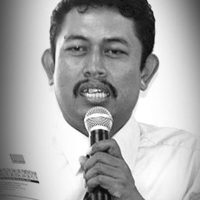QUANTITATIVE RESEARCH METHODOLOGY - IGOV (Dr. Suranto, M. Pol)

Assalamu’alaikum wr.wb.
Welcome to the participants in the Quantitative Research Method Subject for IGOV students. We do hope you will enjoy the course. The course contains material on both descriptive and inferential statistics which will be applied in analyzing the issues of government studies.
TATA KELOLA PEMERINTAHAN PERKOTAAN IGOV (David Efendi, MA)
Objective
The class will deal with the question of governance and regulation large metropolis within complex societies and is related to the development of various types of states and cities.
Cities, metropolises are political beasts. Large metropolis are classically seen as ungovernable, chaotic, violent, corrupt, place of disorder, inequality, segregation, planning failure, environmental disaster and predatory elites. But they are also centres of innovation, engines of growth as much in India as in the US, escalator regions for social mobility, major labour markets, fabric of society though day to day interactions and experiences of different groups, hubs of networks of firms, transports, finances, mafias and gangs, centers of prosperity, at the avant guarde of innovating policies against climate change, reinventing forms of solidary, democracy, and social policy with more tolerance towards migrants and foreigners. Metropolis are in part to be understood within their national states and societies but also through their connections with other cities, articulating different globalization processes. They accumulate resources, institutional capacity, coalitions are organized. Different forms of social order, of politics, of formal and informal activities, of policing are emerging, of provision of collective goods in connection with but beyond the nation state. Cities seem to be able to articulate some inclusive conception of citizenship with the acceptance of some solidarity with migrants.
This requires revised conceptualization of our intellectual tools (or some of them), different methods, and rigorous comparative analysis of what is governed and not governed in those large metropolis, of the making of alternative forms of political and social order, of the invention of new forms of collective action and public policy to deal with majors questions of police, housing, access to water and energy, education, economic development, risks.
This is exactly the right time for this call and this project. Firstly, Cities are back in town. Large metropolis over 10 millions inhabitants have become a common feature on different continents and urbanization processes take different forms in different parts of the globe. Secondly, research about those transformations is dramatically changing, with innovations in methods, vigorous theoretical debates, a new surge of comparative work. Thirdly, beyond classic urban questions and actors, new issues, new non-urban actors and problems are creating an array of different questions for large metropolis, from climate change to financialization, from increased mobility and migration to the coming age of big data. Cities are part of a world of cities, large firms, NGO’s, states, transnational regulations.
Because of different forms of urbanization processes accelerating in different parts of the world (including the stagnation of some large metropolis in India or Africa), innovative comparative research is on the sharp increase in different parts of the globe, sometimes labelled ‘comparative urbanism”. It is articulated to the question of scale, the erosion of nation states and various globalization processes.
Who governs? What is not governed? Who governs when nobody governs the large cities? How are urban metropolis governed? For whom? Are governance questions different in very large metropolis from the global south? How are policies implemented in context marked by informality, different relations to politics?
